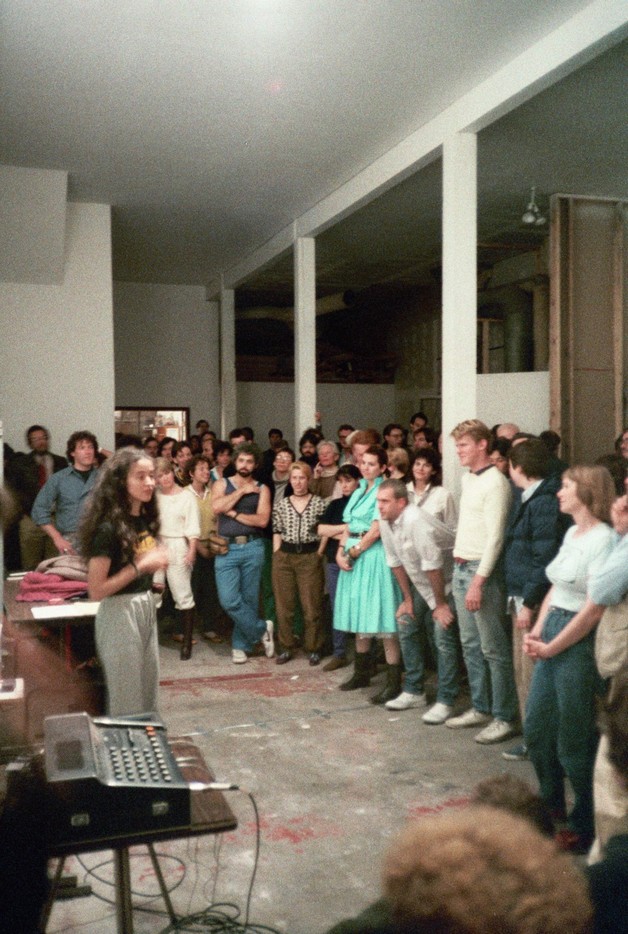14 September – 13 November 2004
John Baldessari, Monica Bonvicini, Andrea Fraser, Martin Gostner, Eva Grubinger, Erik van Lieshout, Marko Lulic, Aleksandra Mir, Adrian Piper, Tino Sehgal, Annika Ström, Barbara Visser, Franz West.
Curated by Jörg Heiser.
The exhibition is funded by the Berlin Capital Culture Fund, the Mondriaan Foundation, and the art section of Austria’s Bundeskanzleramt.
A common resentment against conceptual art is that it was too didactic. The exhibition brings together work by artists that tackle the problem head-on: they undermine the authority of educational forms yet do not simply renounce knowledge and critique. Humour and role play are the disarming weapons used in performance, video, installation, painting and sculpture. New ways open up beyond the cul-de-sac of a false choice between harmless hermeticism and patronizing gestures.
The title of the exhibition is inspired by Adrian Piper’s pivotal piece “Funk Lessons” (1982-1984), a video based on a performance by the artist teaching – a mostly white – audience of students basic and advanced dance routines of funk and soul music. Another classic example is John Baldessari’s “Baldessari Sings LeWitt” of 1972: the artist sings, like a lay preacher, the famous, stern Sentences on Conceptual Art by Sol LeWitt, to the melody of famous songs, among them the US anthem. Or Franz West’s cross between a pedestal and a lectern “Laocoon’s sprimgy head (Lessingmstudy)” of 2002, with a paperback copy of Lessing’s ‘Laokoon, or on the divisions between painting and poetry’ casually placed inside of it. In the book, Lessing plays off sculpture, which according to him was static, against poetry, which was in motion. West counters the assumption with an amorphous, reddish lump mounted with a rusty steel spring onto the top of the lectern.
Works by 13 artists from 6 countries will be on display throughout the whole space of BüroFriedrich from September through November 2004. BüroFriedrich is a non-profit international venue for contemporary art that has already put on several exhibitions dealing with the history and present of conceptualism. Complementing a group of classical pieces (Piper, Baldessari), there are some recent works (Fraser, Grubinger, van Lieshout, West) and some commissioned exclusively for the exhibition (Bonvicini, Gostner, Lulic, Mir, Sehgal, Ström, Visser).
A series of lectures at Münzclub (Münzstr. 23, Berlin Mitte), taking place on Mondays from 13 September, will address the question of didactics in direct exchange with the audience: some of them will take the form of ‘interview’ (Adrian Piper on 8 November, Aleksandra Mir on 13 September), while others will cross over into performance (Barbara Visser, on the opening night, 11 September). A catalogue which will encompass some of the material from these lectures will be published after the exhibition.
Funky Lessons at Münzsalon
Münzstraße 23, 10178 Berlin
admission €4, Members free
Every Monday 8p.m. Jörg Heiser talks to:
13 September Aleksandra Mir (English)
20 September Martin Gostner and Marko Lulic (German)
27 September Kerstin Grether and Klaus Walter “The Funky Lessons of Pop Music” (German)
04 October Thomas Bayrle “The Funky Lessons of Teaching” (German)
11 October Tino Sehgal (German)
18 October ‘No Talk’ – Funky Lessons Surprise Film
25 October Monica Bonvicini (German)
01 November Eva Grubinger and Annika Ström (English)
08 November Adrian Piper (English)

John Baldessari ‘Baldessari sings LeWitt’, 1971, 15 min b&w 
John Baldessari ‘Baldessari sings LeWitt’, 1971, 15 min b&w 
Adrian Piper ‘Funk Lessons’, 1983 
Adrian Piper ‘Funk Lessons’, 1983 
Monica Bonvicini ‘Add Elegance to Your Poverty’ 2002 – 2004 black graffiti on wooden billboard, white paint courtesy the artist 
Barbara Visser 
Franz West ‘Proportion’ 2003, 125 x 25 x 25 cm (courtesy Art & Public-Cabinet PH, Geneva) 
Eva Grubinger ‘Das Diaphaidon oder: Die dezente Verwechslung der Gleichaltrigen’ (‘The Diaphaidon or the Discrete Mix-Up of Contemporaries’) (1991), video on DVD, 19 min. 
Eva Grubinger ‘Das Diaphaidon oder: Die dezente Verwechslung der Gleichaltrigen’ (‘The Diaphaidon or the Discrete Mix-Up of Contemporaries’) (1991), video on DVD, 19 min. 
This work refers to no one, Annika Ström 
I have no theory about this text, Annika Ström 
Aleksandra Mir, ‘Organized Movement, Video diary, Mexico City May 2004’ 
Aleksandra Mir 
Marko Lulic ‘Entertainment Center Mies’, 2003, poplar wood / varnish, 200 x 400 x 140 cm (courtesy: Gabriele Senn Galerie, Wien / Foto: Rainer Iglar) 
Marko Lulic ‘Entertainment Center Mies’, 2003, poplar wood / varnish, 200 x 400 x 140 cm (courtesy: Gabriele Senn Galerie, Wien / Foto: Rainer Iglar) 
Erik van Lieshout ‘LARIAM’, 2001 Video, cardboard, silver foil, tape, 150 x 750 x 240 cm (collection Groninger Museum, Groningen) 
Erik van Lieshout ‘LARIAM’, 2001 Video, cardboard, silver foil, tape, 150 x 750 x 240 cm (collection Groninger Museum, Groningen) 
Martin Gostner ‘Lesung des Armen Poeten’, 2004 
Martin Gostner ‘Lesung des Armen Poeten’, 2004 
Martin Gostner ‘Lesung des Armen Poeten’, 2004 
Andrea Fraser ‘Little Frank and His Carp’, 2001 Video/DVD (courtesy Friedrich Petzel Gallery, New York) 
Andrea Fraser ‘Little Frank and His Carp’, 2001 Video/DVD (courtesy Friedrich Petzel Gallery, New York)
